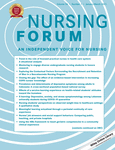Using the 4Ms framework to teach geriatric competencies in a community clinical experience
Abstract
Background
As the population of older adults in the US steadily increases and becomes more diverse, there is an urgent need to integrate geriatric competencies into baccalaureate nursing education.
Purpose
To integrate the Institute for Healthcare Improvement 4 Ms Framework into an existing baccalaureate nursing community clinical experience to build geriatric and interprofessional competencies and promote positive health outcomes.
Methods
As part of the Geriatric Workforce Enhancement Program, 15 students worked with bilingual social workers and community health workers in an affordable housing urban highrise, assessed building residents and implemented personalized plans of care using the 4Ms framework (what matters to the individual, medications, mentation, and mobility).
Results
Students demonstrated competence conducting cognition and depression screening, medication review, and functional and fall risk assessments. Student self-rated achievement of learning objectives ranged from 4.3 to 4.8 (1–5 scale). A retrospective pretest–posttest survey suggested learning about the importance of interprofessional teamwork, and integration of person-centered values when providing care to older adults in the community. Students reflected on barriers to health for older adults in low socioeconomic states and the importance of improving care across the continuum.
Conclusion
The 4Ms framework provided a valuable construct to guide the community experience and teach geriatric evidence-based practice to nursing students.




